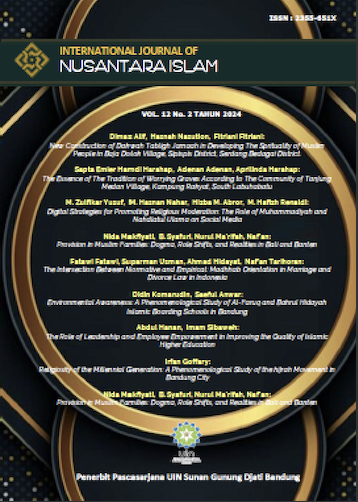The Qur'an and Hadith as a Rule of Law Change: Fatwa Studies of Islamic Organizations in West Java
Main Article Content
Abstract
This study examines how Islamic organizations in West Java use the Qur'an and Hadith as foundations for legal rulings (fatwas) in response to modern challenges. Focusing on Muhammadiyah, Nahdlatul Ulama (NU), and Persatuan Islam (Persis), the research highlights how ijtihad (Islamic legal reasoning) adapts to social and technological changes. Comparative analysis reveals distinct methodological approaches: Muhammadiyah employs rational-textual methods (bayani, qiyasi, istishlahi), NU combines traditionalism with contextual flexibility, while Persis strictly follows scriptural sources. These differences produce varying fatwas - for example, Muhammadiyah declares smoking haram (forbidden) due to health risks, whereas NU and Persis consider it makruh (discouraged) due to weaker scriptural evidence. These variations stem from differing interpretations of texts, social considerations, and methodological priorities. The findings demonstrate Islamic law's ability to address contemporary issues while maintaining core principles. The study suggests that fatwa differences reflect each organization's intellectual tradition and social context rather than fundamental disagreements about Islamic law. Future research could explore: (1) regional variations in fatwa formulation across Indonesia, (2) interdisciplinary studies combining Islamic jurisprudence with social sciences, and (3) the impact of digital technology on ijtihad processes. Such studies would deepen understanding of how Islamic legal traditions interact with modernity in diverse Muslim communities.
Article Details
The Authors submitting a manuscript do so on the understanding that if accepted for publication, copyright of the article shall be assigned to International Journal of Nusantara Islam, Sunan Gunung Djati State Islamic University.
The copyright encompasses exclusive rights to reproduce and disseminate articles in all forms and media, including reprints, photographs, microfilm, and similar reproductions, as well as translations. Some or all of the contents of this journal can be stored in databases and transmitted in any form and media without the need for written permission from the International Journal of Nusantara Islam, Sunan Gunung Djati State Islamic University.
The Editors and the Advisory International Editorial Board make every effort to ensure that no wrong or misleading data, opinions or statements be published in the journal. In any way, the contents of the articles and advertisements published in the International Journal of Nusantara Islam (IJNI) are sole and exclusive responsibility of their respective authors and advertisers.
References
A. Hassan. (1972). Risalah al-Qur’an dan al-Sunnah. Surabaya: Pesantren Persis, Bangil.
A. Hassan. (1984). Ijmâ, Qiyâs, Madzhab, Taqlîd. Surabaya: LP3ES Pesantren Persis, Bangil.
A. Hassan. (2010). Al-Furqan, Tafsir al-Qur’an: Tafsir surat al-Baqarah ayat 106. Jakarta: Universitas al-Azhar Indonesia.
Abdullah, A. (1996). Studi Agama, Normativitas atau Historisitas? Yogyakarta: Pustaka Pelajar.

